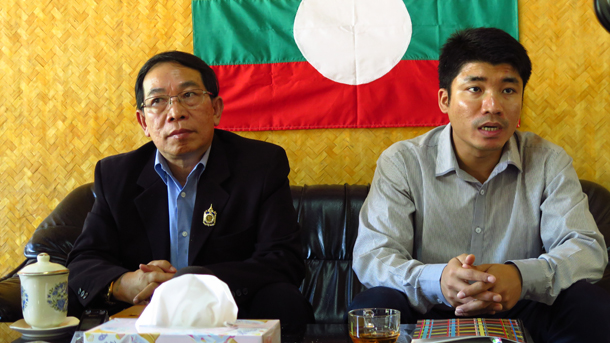CHIANG MAI, Thailand — The Restoration Council of Shan State (RCSS) and the United Nationalities Federal Council (UNFC) met in Chiang Mai on Tuesday to defuse recent tensions after clashes between two ethnic armed groups in northern Shan State.
Since the end of November there has been simmering military tension between the RCSS, a signatory of the government’s so-called “nationwide” ceasefire agreement, and the Ta’ang National Liberation Army (TNLA), a member of the UNFC alliance, over territory in Namkham Township near the Chinese border. It appears that Tuesday’s meeting has, at least temporarily, smoothed over the dispute.
Both sides have accused the other of instigating the conflict, which occurred in an area that has traditionally been under the TNLA’s control.
“We are not the enemy, so we must meet and negotiate,” Lt-Gen Yawd Serk, chairman of the RCSS, said, remarking that it remains a “question as to why they [the TNLA] attack us.”
Gen. Be Htoo of the Karenni National Progressive Party led UNFC representatives in meeting with Lt-Gen Yawd Serk and his deputy, Col. Sai Ngin.
The RCSS also urged the TNLA to immediately release civilians it accused the group of detaining, with Yawd Serk saying that “people are in fear” until the two sides meet.
The TNLA maintains that the Shan State Army-South—the armed wing of the RCSS—and the Burma Army cooperated in attacking its forces, a claim strongly denied by Yawd Serk.
TNLA spokesperson Tar Ban La could not say on Tuesday whether a meeting with the RCSS would occur. He added that his organization would wait for additional information from the UNFC after Tuesday’s meeting concluded.
The RCSS is also reportedly at odds with the Kachin Independence Army’s 4th Brigade, also based in northern Shan State. The KIA, a member of the UNFC, is not a party to the government’s ceasefire accord.
In recent months, the Burma Army has also launched an offensive against the Shan State Progressive Party in northern Shan State. Clashes that began on Oct.6 have displaced an estimated 10,000 refugees in Mong Hsu and Kyethi townships.
Ywad Serk said that the government should be focusing on negotiating with non-signatories to its ceasefire agreement.
“We can’t reach a political solution if the Burma Army keeps carrying out military offensives,” he said.
The UNFC held its annual council meeting last week and also formed a nine-member committee to continue political negotiations with the next government. Twan Zaw, secretary of the UNFC and a leader of the Arakan National Council, told reporters that Tuesday’s meeting was convened to encourage greater collaboration between those present.
“The NCA is not a barrier between us, even though we have not yet signed it,” he said.
He added that the UNFC will continue working to mediate conflict between the RCSS and the TNLA, an issue that was also raised at last week’s council meeting.

















